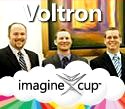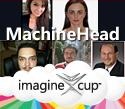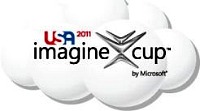UALR Teams Vie for Microsoft National Software Competition
For the second year, two teams of students from UALR are heading to Microsoft’s Imagine Cup to compete in the U.S. National Finals Software Design category.
 From UALR’s College of Business, Team Voltron— seniors Johnathan Tate of Marshall, Texas, Stephen Burks of Benton, and graduate student James Taylor of Little Rock— was selected as one of five teams to compete in the fall qualifying round April 8-11 in Redmond, Wash.
From UALR’s College of Business, Team Voltron— seniors Johnathan Tate of Marshall, Texas, Stephen Burks of Benton, and graduate student James Taylor of Little Rock— was selected as one of five teams to compete in the fall qualifying round April 8-11 in Redmond, Wash.
 Representing UALR’s Donaghey College of Engineering and Information Technology (EIT), Team MachineHead— graduate students Engin Mendi and Serpil Tokdemir from Turkey, Albert Moropoulos of Little Rock, and UCA undergraduate Ecehan Bayrak of Little Rock— was also selected to compete in Redmond.
Representing UALR’s Donaghey College of Engineering and Information Technology (EIT), Team MachineHead— graduate students Engin Mendi and Serpil Tokdemir from Turkey, Albert Moropoulos of Little Rock, and UCA undergraduate Ecehan Bayrak of Little Rock— was also selected to compete in Redmond.
“This is a major accomplishment – the competition was stiff,” said Team Voltron coach, Janet Bailey, associate professor of management information systems (MIS) who has coached Imagine Cup teams from the business college for the last three years. She was invited by Microsoft to write an article on being an Imagine Cup faculty mentor. A summary of the article is also on the company’s faculty connection page.
In UALR’s first year of participation, Bailey had two teams make it to the U.S. National Finals in 2009. One took third place and was selected for the World Imagine Cup Suzanne Mubarak Special Award category in Cairo, Egypt. In 2010, she had another team selected to represent the U.S. in the World Imagine Cup Embedded category at the World Imagine Cup in Warsaw, Poland.
Team Voltron’s software application will harness the power of crowdsourcing by collecting information from parents of children with cancer, matching it up with GIS data, and running data analytics against the data, which will be stored on the Microsoft Azure cloud platform, to look for causes of pediatric cancer.
The cloud-based solution will allow parents of pediatric cancer patients around the globe to enter exposure factors, genetics, and previous diseases, both chronic and curable, for data-mining by researchers anywhere in the world.
By creating a global dataset for analysis by research manpower around the globe, the odds of finding a cause for pediatric cancer can improve dramatically. Team members have enabled the application to be translated into 35 different languages.
 In the People’s Choice Award Imagine Cup competition, Team Voltron is currently in third place. The public can vote via Facebook or by texting “VOLTRON” to 2300.
In the People’s Choice Award Imagine Cup competition, Team Voltron is currently in third place. The public can vote via Facebook or by texting “VOLTRON” to 2300.
Another UALR College of Business team, Team H-2-O, coached by James Parrish, assistant professor of MIS, was in the running for the Windows Phone 7 world competition but fell short of qualifying.
Coskun Bayrak, professor of computer science and EIT’s coach, said Team MachineHead has developed a text-to-audiovisual synthesizer system for children with learning disabilities such as dyslexia that hinders their ability to read, write, listen or speak despite having normal intelligence.
“All of the credit goes to the team members who have invested extensive time and effort,” he said. “Without their dedication, this milestone would not be achieved.”
Team MachineHead’s synthesizer system can create facial animation from any source of given textual information. Speech intelligibility and perception can be significantly improved by adding a visual channel. In this system, a realistic virtual actor speaking the text— offered in several languages— on a screen or in a mobile environment can greatly help children having difficulties in reading, writing and listening.
In the People’s Choice Award, Team MachineHead is currently in sixth place. Vote on Facebook or by texting “MHEAD” to 23000.